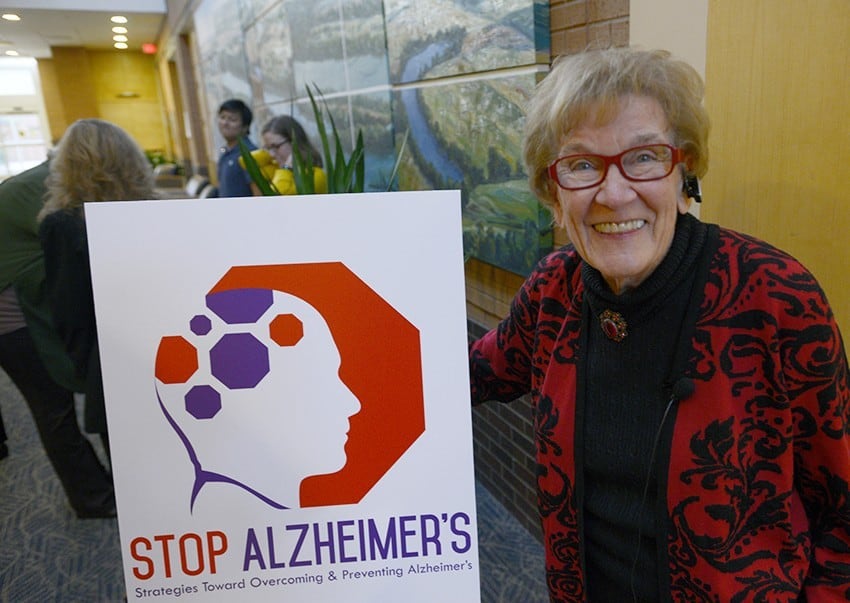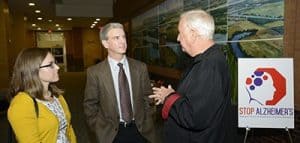STOP Alzheimer’s Forum Draws Crowd

Jeanne Wei, M.D., Ph.D., speaks at the STOP Alzheimer’s Forum about how glucose levels can cause the premature aging of blood vessels. Steve Barger, Ph.D., right, also was one of the event’s panel of speakers.
| Nov. 12, 2015 | Deaths from Alzheimer’s disease increased 68 percent in the first decade of the century, a STOP Alzheimer’s education forum audience learned recently.
About 90 people filled a large conference room Nov. 3 at the UAMS Donald W. Reynolds Institute on Aging to hear UAMS researchers tell how they are working to better understand and treat Alzheimer’s.
The Strategies Toward Overcoming and Preventing (STOP) Alzheimer’s Fund is a UAMS-created program that raises awareness about the disease and supports Alzheimer’s disease research at the institute. In February, STOP Alzheimer’s held a similar event about the history, symptoms and stages of Alzheimer’s disease as well as the institute’s support services and research into its causes.
Sue Griffin, Ph.D., professor and vice chairman for research in the Donald W. Reynolds Department of Geriatrics in the UAMS College of Medicine, is an internationally known Alzheimer’s researcher.
She told the audience that from 2000 to 2010, deaths due to breast cancer declined by 2 percent, prostate cancer by 8 percent, heart disease by 16 percent and HIV by 42 percent while deaths from Alzheimer’s disease rose by 68 percent.
The audience also heard from Jeanne Wei, M.D., Ph.D., executive director of the institute; Robert Shmookler Reis, D. Phil., professor in the departments of Geriatrics, Biochemistry/Molecular Biology, and Pharmacology/Toxicology; and Steve Barger, Ph.D., a professor in the departments of Geriatrics, Neurobiology & Developmental Sciences, and Internal Medicine.
Wei reviewed findings from research at UAMS and other universities that show how either high or low glucose can cause premature aging of blood vessels and how low glucose can be detrimental and dangerous to older people.
Shmookler Reis presented a brief overview of his findings regarding age-dependent neurodegenerative diseases, including Alzheimer’s disease, and how around neurons they progressively form protein aggregates that are potentially attractive targets for drug therapy.
Barger explained how the barrier that protects the brain also limits its access to glucose and other nutrients, requiring special transporter proteins. Type-2 diabetes and its precursor — insulin resistance — cause dysregulated blood glucose levels, and the brain (which consumes a lot of glucose) suffers when it is either chronically high or dips too low. Normally it would have top priority for nutrients, but in diabetics the transporters are less efficient, making the problem even worse. This interplay contributes to the known increase for diabetics in the risk of developing Alzheimer’s and vice versa.

Robert Shmookler Reis, D. Phil., explains to the forum audience how protein aggregation occurs in age-dependent neurodegenerative diseases such as Alzheimer’s.
“Two thirds of Alzheimer’s cases are preventable,” Wei said. “Those are usually cases in which Alzheimer’s develops in a person’s 70s and up, not the cases where it is caused by inherited mutations, which become manifest earlier, sometimes in ones 40s and 50s.”
She also described two drugs under development that could aid cardiovascular health in such a way that cognition also improves in patients.
“Pharmaceutical companies finally are figuring out that if they can make a dent in Alzheimer’s, then it’ll be better for everybody,” Wei said.
The average cost of care per patient is more than $50,000, with 40 percent of that being out-of-pocket costs for the patient or patient’s family. Median income in Arkansas is around $22,000, she said, making finding more effective treatments for Alzheimer’s disease a critical health care challenge so that the burden can be diminished.
Research funding from 2000 to 2010 that went to breast cancer and heart disease research, for example, was at levels nine to ten times that spent on Alzheimer’s.
“STOP Alzheimer’s is a campaign because there is not enough money for research, although researchers are working hard on new, good ideas.” Griffin said. “We are pursuing treatment strategies for preventing Alzheimer’s, and the research into those possibilities is going on right here in the Reynolds Institute building.”

